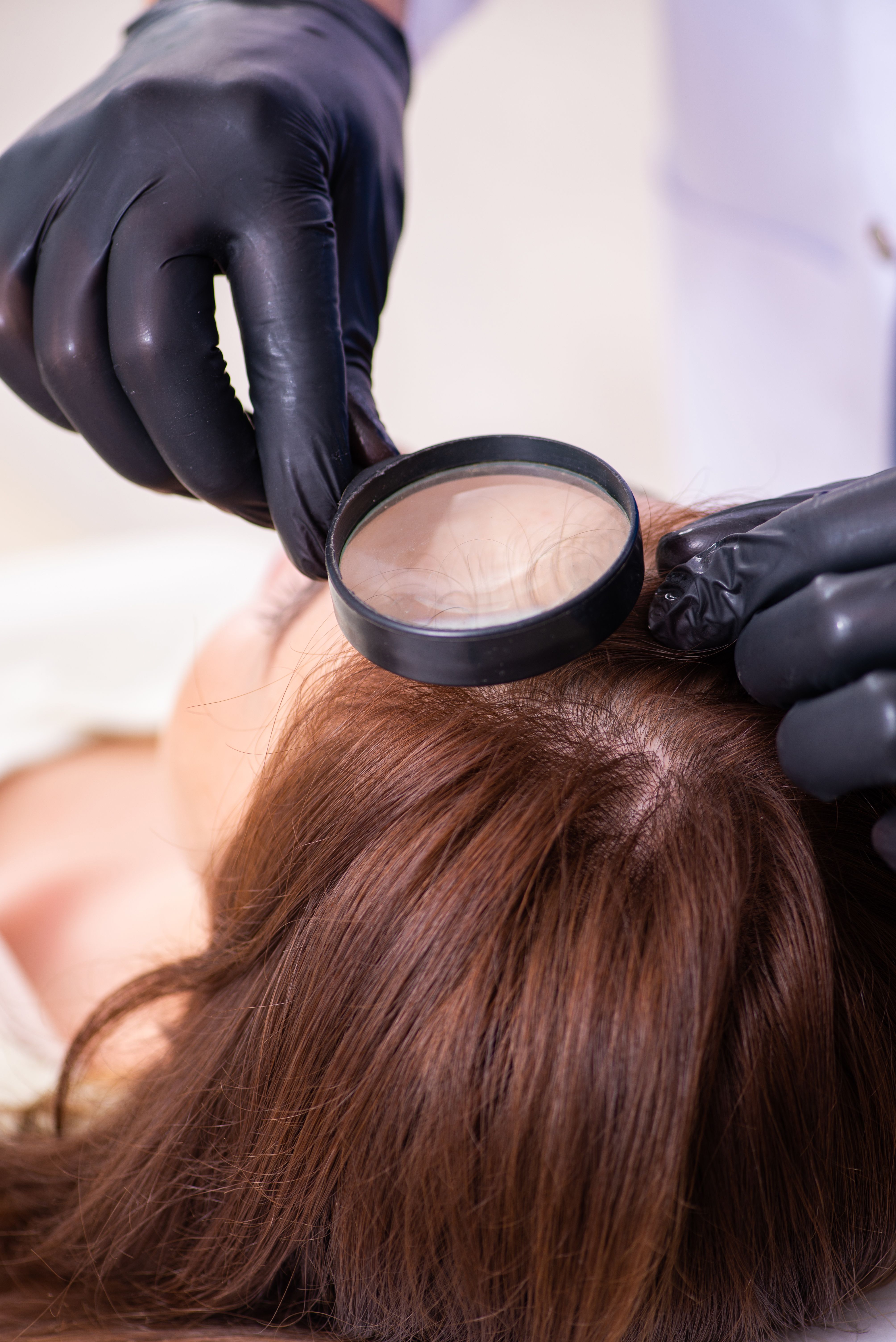- Center on Health Equity & Access
- Clinical
- Health Care Cost
- Health Care Delivery
- Insurance
- Policy
- Technology
- Value-Based Care
Study Finds Significant Hair Regrowth in Patients With Patchy AA Following Baricitinib Treatment
Baricitinib was found to be an effective treatment for patchy alopecia areata (AA), in a retrospective study, with most patients experiencing hair regrowth after 4 to 16 weeks of treatment.
Doctor using magnifying glass to view scalp regrowth | Image Credit: Elnur - stock.adobe.com

A real-life study with 1-year of follow-up found that baricitinib (Olumiant) was effective and tolerable as a hair regrowth treatment in patients with patchy AA.
Baricitinib, approved in 2017 by the EMA, is an orally administered Janus kinase inhibitor for patients with inflammatory diseases.
In a retrospective analysis, participants from a monocentric cohort with a Severity of Alopecia Tool (SALT) score of 50 or higher were treated daily with 4 mg of baricitinib. Patients achieving a SALT score of less than or equal to 20 at the end of follow-up were considered primary outcome results.
Patient demographics, clinical characteristics, and treatment history were recorded for a total of 19 participants.The most common previous treatments among participants included topical corticosteroids, minoxidil 2% / 5%, and intralesional corticosteroid injections.
The median treatment duration had to be between 8.5 (10) months for participants to be considered to have complete hair regrowth. Patients who experienced no sign of hair regrowth were previously diagnosed with long-lasting alopecia universalis (AU). Discontinuation of the drug occurred in 3 patients, with 2 relapsing a few months after discontinuation. One patient had their dosage decreased to 2 mg baricitinib daily after reaching complete hair regrowth with a small patch reoccurring 4 months after dosage decrease.
The majority of the cohort was female, with a median disease duration of 13 years, and the median age (IQR) was 35 (12) years. The median follow-up duration was 23 months for patchy AA, 11.7 months for alopecia totalis (AT), and 12 months for AU.
Results found hair regrowth in 89.5% of patients following 4 to 16 weeks after treatment initiation. The primary outcome was achieved in 14 of the total 19 participants (73.7%). A 100% hair regrowth score was achieved for patients with patchy AA, followed by patients with AT with 50% and patients with AU at 33.3% hair regrowth.
Only mild adverse events (AEs) were recorded. The most common AEs reported were altered lipid status (26.3%), headaches (15.8%), transaminitis(10.5%), acne (5.3%), and an increased creatine phosphokinase (5.3%).
Limitations of the study were a result of the significantly small sample size, along with the retrospective design. However, the present results showed more regrowth when compared with previous clinical trials. Patients in European countries often struggle to access AA treatment, particularly because these therapies are not reimbursable. This is because many European governments do not view AA as a major psychological impact that affects patient quality of life, making AA a low priority for health officials.
The retrospective study results observed substantial improvements for patients with the patchy phenotype of AA. Authors noted, “poorer regrowth prognosis observed for patients with totalis or universalis AA, as well as the risk of relapse after treatment discontinuation, need to be considered.”
Reference
De Greef A, Thirion R, Ghislain PD, Baeck M. Real-life effectiveness and tolerance of baricitinib for the treatment of severe alopecia areata with 1-year follow-up data. Dermatol Ther (Heidelb). 2023;13(11):2869-2877. doi:10.1007/s13555-023-01030-x
The Breakdown: Breast Cancer Research Awareness Day
August 19th 2025Breast cancer is the second most common cancer among women and the second leading cause of cancer-related deaths among women in the US. In light of Breast Cancer Research Awareness Day, The American Journal of Managed Care® breaks down the most recent advancements in breast cancer prevention, screening, and therapies.
Listen
